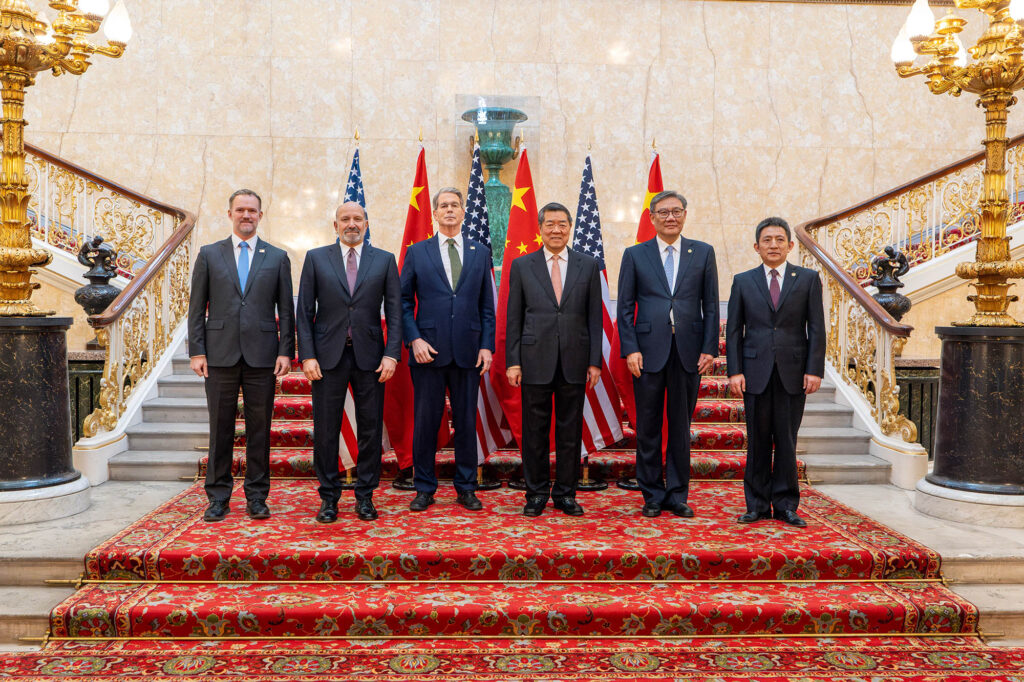🔴 Website 👉 https://u-s-news.com/
Telegram 👉 https://t.me/usnewscom_channel
Most of us were blissfully unaware of one of the potentially dire consequences of the recent trade wars with China: a shortage of rare earth magnets, which are a critical component of every car engine, smartphones and military weapons systems.
China’s April export ban on magnets and six rare earth elements was payback for President Trump’s tariff hikes.
It threatened to cripple automotive production lines and risk national security.
China has a near-monopoly on these crucial resources, which is a frightening reality in today’s interconnected world.
But two can play at that game, and the Trump administration swiftly matched Chinese aggression with some potent weapons from our own trade arsenal after trade talks last month in Geneva failed to resolve the issue.
The retaliation measures, cooked up by Treasury Secretary Scott Bessent and Commerce Secretary Howard Lutnick, included a ban on critical American aircraft parts, semiconductors and a petrochemical called ethane, which China uses to make plastic.
Secretary of State Marco Rubio also threatened to “aggressively revoke” visas for Chinese students.
Every couple of days there was new payback from the US, as Trump ratcheted up the pain in stages.
The pain was what finally brought the Chinese back to the table this week.
In addition to punishing tariffs, the payback measures hit the already sluggish Chinese economy hard.
Export growth is down more than 30%, and factory activity reportedly is slowing, while domestic demand is weak.
‘Planely’ in trouble
By last week, when Trump and Chinese President Xi Jinping had a long, conciliatory phone call, China had 250 planes grounded and another 250 planes a week due to become inoperable.
After the call, Trump declared that he wants to “open up China” and dispatched Bessent, Lutnick and trade envoy Jamieson Greer to London for truce talks with a Chinese delegation led by Vice Premier He Lifeng.
UK Prime Minister Keir Starmer, who pulled off the first trade deal under the new Trump tariff regime, provided neutral territory for the negotiations in Lancaster House, an elegant 19th century building in the St. James’s district of central London, around the corner from King Charles’ residence.
Trump’s presence was acutely felt by the US negotiators, not least because the room in which they worked from early morning to close to midnight Monday and Tuesday features gilt-edged cornices, golden chandeliers, rich red draperies and red and gold carpet, an echo of the newly redecorated Oval Office.
At night, the Americans ate British pizza while the Chinese ordered in KFC and McDonald’s.
The Chinese negotiators incessantly brought up the readout of Trump’s call with Xi, periodically losing their cool and growing “passionate,” as one observer described it.
But in the end, they did the deal — or at least de-escalated tensions in preparation for a final trade agreement between the world’s two biggest economies.
China will resume supply of the magnets and critical rare earths “up front,” and Chinese students will be welcome again at US colleges and universities, the president wrote on Truth Social Wednesday morning.
The other pain points will ratchet down over time.
“OUR DEAL WITH CHINA IS DONE, SUBJECT TO FINAL APPROVAL WITH PRESIDENT XI AND ME. FULL MAGNETS, AND ANY NECESSARY RARE EARTHS, WILL BE SUPPLIED, UP FRONT, BY CHINA. LIKEWISE, WE WILL PROVIDE TO CHINA WHAT WAS AGREED TO, INCLUDING CHINESE STUDENTS USING OUR COLLEGES AND UNIVERSITIES (WHICH HAS ALWAYS BEEN GOOD WITH ME!). WE ARE GETTING A TOTAL OF 55% TARIFFS, CHINA IS GETTING 10%. RELATIONSHIP IS EXCELLENT! THANK YOU FOR YOUR ATTENTION TO THIS MATTER!”
Wall Street rallied at the news, although there is still work to flesh out the rest, with tariffs to stay at levels agreed to in Geneva, potentially yielding $250 billion annually.
It was an important test for the cohesion of the US side, which Trump has had an eye on lately.
Competition between Bessent and Lutnick has been the talk of DC as the billionaire former Wall Street alphas butt heads over their overlapping responsibilities and distinctively different personalities.
Trump often praises the reserved patrician Bessent as straight out of “central casting” and native New Yorker Lutnick as “a killer.”
Tag-team negotiators
But Lutnick could not have been more complimentary about Bessent in an early morning phone call Wednesday as Lutnick was jetting home from London.
“The combination of Secretary Bessent, Ambassador Greer, and me played incredibly well,” he said.
“Scott was really strong [and] there was a lot of respect . . . The three of us were tight. You couldn’t get a wedge between us . . .
“When we needed it, Scott played a certain hand . . . when it was right for him to be pissed off, he closed his book [as if he were going to leave] or wagged his finger.”
This was a marked change from a report in Nikkei Asia earlier this month that “open disagreements, competition and confusion” among the three US negotiators had marred tariff talks with Japan.
“At one point, the three Cabinet officials put the talks with the Japanese side on hold and began debating right in front of them,” a source told Nikkei.
But according to Lutnick’s account, any philosophical differences they may have on trade and economics have been resolved and they presented a united front for the Chinese, to the great benefit of America.
While Trump’s detractors bemoan his upending of world trade, Bessent describes the president’s approach as “strategic uncertainty,” which can yield surprising benefits. Despite the angst, so far it seems to be paying off.
